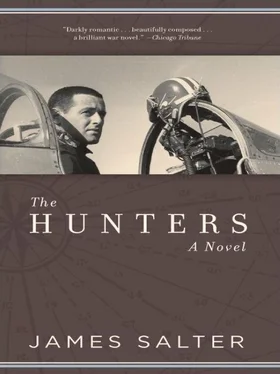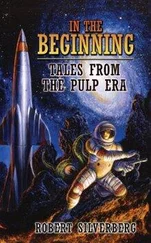“You should have gotten them long before this, Colonel,” Robey said generously. “You just didn’t have the breaks. Sometimes you have to wait for them, eh?”
“It certainly makes a difference when you have a couple,” the colonel confided. “I was thinking I’d never have any luck. I finally see what you mean about getting them going away, too. I never would have gotten that second one if I hadn’t reversed at the right time. He was just passing underneath me, and when I turned back I had a quick shot from less than five hundred feet.”
The colonel swung around to Cleve.
“It only took one burst,” he explained. “I still had over half my ammo when I got back.”
“You must have waited until he was pretty close before you broke,” Cleve said.
“Damned close.”
“Another thing that’s important,” Robey interrupted, “is always take the last man in the formation if you can.”
The colonel turned to listen to him, nodding appreciatively as he was told a story of how Robey failed to get a kill because he had not done that. Cleve left.
It was all unbelievable. Cleve was completely unaccustomed to the part he was playing, like a man who suddenly finds himself seriously ill. It was true, and he had to accept it, but it was somehow wrong, immensely so. His spirit was ebbing. He tried to present the same attitude he always had—even, capable; and though he was fairly successful in doing it, within he was broken. He had to consciously prevent himself from seeking sympathy or complaining. He said nothing. He kept it inside, where, like a serpent, it devoured him—heart, stomach, and soul. He devoted himself to his flight, working on Pettibone, encouraging Hunter, cautiously opening himself toward Pell. Meanwhile he lived on dwindling hope, always finding some for the next day somehow.
There came a morning like autumn or the long marble corridors of some museum. The sunlight seemed preserved as it gleamed from sleeping surfaces, and the air was still. They were on the second mission of the day.
“Great, Billy,” Cleve told Hunter as they left the briefing and walked through the mild winter noon. “You’ve got No Go, and I have the Guzzler.”
They were scheduled in one of the last flights and had been assigned the oldest, most troublesome ships. Hunter’s was notoriously slow, and Cleve’s drank fuel. Hunter laughed a little.
“This is the day that we’re bound to run into a hundred of them,” he said.
The previous mission had been in a running fight along the Yalu, but with no conclusive results. It was the first time that the MIGs had been up in several days, and there was a chance that they would be flying again this time, Cleve hoped.
“I’ll be surprised if we just make it up there and back in those dogs,” he said.
The locker room was never pleasant for Cleve. As they dressed, he felt the usual pre-mission discomfort. He was glib, but there was a looseness in his knees and the insistent uneasiness of what was he doing involved in all this? There was plenty of time to dress, too much time he had always felt. He talked with DeLeo and Pell, briefing them additionally. At last they all went out to the ships. Two members of a flight that was not going stood near the door as everybody left.
“Get one for me,” they burlesqued.
The time before takeoff was always difficult, too. The mind could occupy itself, but the dumb, quavering heart could do nothing. Cleve sat in the cockpit, checking the second hand on his wrist watch. He drummed his fingers on the tight metal skin of the ship. Finally, it was time to start engines. He passed gratefully into the realm of function.
Once they were into it, the sky was clear, and bright sunny blue. It was a sky, Cleve thought, you could see tomorrow in. He looked over toward Hunter on his wing. DeLeo was flying number three, wide on the opposite side, just then moving into position with Pell number four out beyond him. They climbed north, over the quiet Haeju Peninsula and then across the edge of the Yellow Sea, heading the shortest way for Antung.
A fight seemed to have started already. They could hear the loud, excited transmissions of one flight among the MIGs. They were late, Cleve thought angrily. He pushed the nose of his ship down slightly, lowering the rate of climb and increasing the forward speed. He wanted to get to the Yalu as soon as possible.
At thirty-four thousand feet they began to leave smooth, persistent trails in the air. Cleve stopped climbing and dropped down several thousand feet to remain below the contrail level where they would be less visible. The river seemed deserted when they reached it. They could not locate the fight. Cleve asked several times where it was, but was unable to get any clear answer over the radio jammed with voices. He heard the ground control radar calling out train number four. There were many MIGs in the air, he knew, somewhere.
“Bandit train number five leaving Antung.” In the tunneled voice of a stationmaster another one was announced. “Train number five leaving Antung, heading three five zero.”
“Drop tanks,” Cleve ordered.
He felt a buoyancy that was both fear and expectation. From here on, he was working against time to find them. He headed up the river, passing occasional elements, all friendly. He scanned the wide sky meticulously, high and low. There was a speck of dirt on the plexiglass canopy that looked like a distant airplane every time his eye passed over it. Despite himself, it tricked him again and again. Aside from that, there was nothing. As he turned to go down toward the mouth of the river he saw four ships chasing two MIGs far below, flashes of silver against the snowy ground. The radio was cluttered increasingly with cries of battle.
“Bandit train number six leaving Antung.”
It seemed impossible to be traveling through so big a fight without finding anything. A desperate sensation of futility seized him. He was certain he was heading in the wrong direction, but he had turned less than a minute before. He could not cover ground fast enough. He felt as if he were merely hanging in air.
Someone called out sixteen MIGs heading south.
“Where?” Cleve asked.
No answer.
“Where are the sixteen MIGs?”
“Heading south! Sixteen crossing the river!”
“For Christ’s sake, where?”
There was no answer.
Suddenly Pell called out something at three o’clock. Cleve looked. He could not tell what it was at first. Far out, a strange, dreamy rain was falling, silver and wavering. It was a group of drop tanks, tumbling down from above, the fuel and vapor streaming from them. Cleve counted them at a glance. There were a dozen or more, going down like thin cries fading in silence. That many tanks meant MIGs. He searched the sky above, but saw nothing. They were somewhere in that deep blue, though; they had to be. At great distances planes could appear and vanish before the eye as they turned or rolled out, depending upon the surface they presented, but these must be close. He had to see them. Segment by segment he checked and discarded the sky above. Then, from nowhere, there were two MIGs sailing past, headed the other way.
“There’s two on the left!” Cleve called. “Let’s go.”
He turned—a delicate, speed-killing proposition at altitude—and fell in far behind them. It was another chase, long and useless, but they were going south. Sooner or later the MIGs would have to turn back. Cleve took a chance on that. He would never catch them otherwise, in the extended straightaway.
He looked back to check Hunter. DeLeo and Pell were not following. DeLeo called that he was breaking off to go down after some others. Cleve could not see them. He looked forward again. A moment later the MIGs he was trailing started a wide, climbing turn. It was sooner than he had hoped for. He cut to the inside, gaining on them.
Читать дальше












